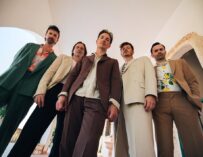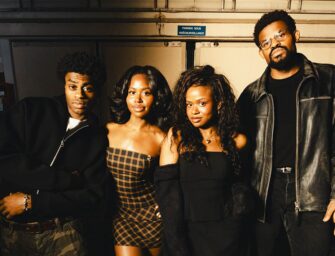
The Feeling’s Dan Gillespie Sells: “We were on fire as a band in our early 20s, playing together, doing it for the sheer joy of it and trying to make the most beautiful record we could.”
The feelgood pop rocksters’ frontman and songwriter fills us in on their new album and his foray into musical theatre
When listening to the first four singles from British pop-rock band The Feeling, you immediately got the sense that they were one of the most aptly-named groups out there. Sewn, Fill My Little World, Never Be Lonely, and Love It When You Call (each released in 2006), all wore their yearning hearts on their catchy sleeves and made Dan Gillespie Sells and his bandmates the mid-00s poster boys for music that was brazenly infectious and soul-baringly sentimental.
A flame to attract anyone experiencing the full gamut of love and heartbreak, it’s no surprise that their music found plenty of welcoming ears. On its way to earning its Triple Platinum status, debut album Twelve Stops And Home reached No 2 in the UK album chart and their 2008 follow-up Join With Us went one further when it topped the charts. Not just fan favourites, The Feeling were also named Songwriters of the Year at the 2007 Ivor Novello Awards.
As he and the band prepared to release their seventh studio album, San Vito, we caught up with Dan while he was working in Los Angeles. We learn how The Feeling got going, the challenges of their immediate success, and his work writing songs for the Olivier award-nominated musical Everybody’s Talking About Jamie…
Read Sodajerker’s podcast episode with Dan Gillespie Sells from 2016
Listening back to Twelve Stops And Home now, it’s apparent to me that there was so much confidence and swagger – it doesn’t sound like it was your first album. Was that simply youthful bravado?
“I suppose what happened was, when we made that record, we’d been playing covers in the Alps, we had residencies in different bars and played 10 shows a week… That many sheer amount of hours on stage playing together. And by playing covers, you’re playing some of the best songs…whatever would get people on the dance floor, whatever gets people going. And we loved doing retro stuff. We were delving into some of our favourite records and trying to cover songs that no one else was covering. That’s how we got all the gigs.
“That kind of really informed us as a band, musically. And I think it also made us really competent in the studio. I mean, when I say studio, our studio was a shed! We were on fire as a band in our early 20s, playing together, doing it for the sheer joy of it and trying to make the most beautiful record we could. And I think that’s what came across about it.
“Actually, the success made it quite difficult. I think everyone feels this when they have their first big success. It’s quite difficult to recapture that. Because, suddenly, there was no pressure…and a real drive to create something fresh and new. It’s something that other people weren’t referencing at the time…you become a bit of a musical archaeologist and you’re picking up things that you think no one’s ever heard. Of course, no one’s ever doing anything truly new.
“A lot of the NME-style journalists absolutely hated us. A few people got what we were doing, they thought it was a genuine artistic choice, which it was. But a lot of people thought that we were some kind of weird manufactured band, which is bizarre, because we made a record in the shed!”

The Feeling’s Dan Gillespie Sells: “I didn’t want to be in that world where we were still being judged.”
Did those negative opinions affect you?
“By the time we were doing our second album, I was expecting the climate to have changed a bit. So we did the same thing and it went to number one, and it was very lovely, but I didn’t want to be in that world where we were still being judged. Because we were getting called ‘not credible’. And I’m just like, ‘What’s credible?’ It was a self-produced, self-written, self-engineered album – I don’t understand what you mean! And I think the sheer success out there made it quite difficult to not be self-conscious making the next album, then the next album… And then, actually, the best thing that ever happened to us was leaving Island records…because we kind of went independent and rediscovered our mojo.”
That’s the thing with trends and fashion, it’s so fickle, isn’t it.
“Yeah, I realised ‘cool’ didn’t mean anything was good or bad. It was an artistic choice, and maybe a kind of aesthetic choice, but it wasn’t the be-all and end-all. I realised at a certain age, probably about 20 or 21, I was like, ‘Oh, cool? It’s not for me.’”
Talking of which, how did you get into co-writing away from the band and writing for musical theatre?
“Well, I think that happened kind of by accident. I always knew I wanted to do something in theatre` and then I met Tom [MacRae], the co-writer of Everybody’s Talking About Jamie. We were introduced to each other by somebody and he’s a great writer. I’d been trying to find a writer to work with, so I said, ‘Would you be interested in doing a musical?’ And he said, ‘Yeah, I’ve always wanted to do a musical,’ and he knew the band, so we kind of started doing stuff together. Then we got introduced to Jonathan [Butterell, who ended up directing the West End production] and then the three of us made the show.
“But I think, on a songwriting level, the reason that musical theatre suited me so well, was twofold… The first being that after three or four albums, it was getting harder and it’s getting less automatic that you would have something to write about, because you’ve explored so much of your own inner stuff. And when it’s all just about you as a writer, then it gets to a point where you’re like, ‘How much more have I got to scrape from my soul in order to kind of make these songs?’ So musical theatre gave me an opportunity to write about characters and other people, and our shows had something to say, and through them, I would express myself. And I think, musically, that’s really important to find a way of still expressing yourself, but coming at it from a different angle. I learned how to come at it through a character. It’s still my ideas, my thoughts and my philosophies, but they’re coming from through a character or through a storyline. That really liberated my writing that I had something to write for, as opposed to just for myself.”

The Feeling’s Dan Gillespie Sells: “I love doing theatre because there’s no limit to the amount I can throw at a song.”
Did you find that easier, or was it challenging to write in a different way?
“I found it absolutely thrilling and I threw myself into it. I found it liberating because I still had the craft of a songwriter, I still had all those things that I’d learned and those tricks, but I got to throw them into something which had a purpose already set out, as opposed to sitting at a piano trying to figure out what the purpose is, for a song. And I do think purpose is really important for a song, as a songwriter. You kind of go, ‘What’s this song for?’ And there’s nothing more difficult than trying to write a song without a purpose, it’s heartbreaking. After this many years, and this many albums, I kind of thought there’s enough music out there. What do they need another song for? You’re at the point where you’ve got all your ego stuff out the way and you’re not 21 any more, full of ideas.”
What did you learn through the process of writing for a theatre production, compared to the writing with the band?
“I learned so much about specificity, the importance of every single word and every phrase, and the rhythmical importance of a song – how long you hold off an idea and how much new information you bring. All the things that I think I was doing automatically, subconsciously learning through listening to great pop music throughout the generations. I was soaking that stuff up and trying to kind of recreate it, but then I hadn’t thought about it in depth. And when you’re in the middle of a production and you’re previewing material in front of 1000 people a night, you’re really getting into the nitty-gritty of how many bars it should be before you do the next transition, all that kind of stuff… I find that fascinating. And now I have to work with musical directors and other artists and other performers, and I have to explain to them why I’ve made the choices I’ve made, that I’ve become a bit more analytical about it. Not necessarily before writing, but after the fact. You have to explain that to people, otherwise they don’t quite get it.
“And, the other thing I was going to say, in a musical landscape which has become harmonically quite stagnant, like pop music, it’s become quite limiting as to how much music you can put in your music. Particularly if I’m going to try and get a song on the radio, for example – even if it’s with The Feeling, who are always a bit old-fashioned – I’m going to pick the song with the least amount of changes, without the modulations, not the song with the big intro… It’ll be the song with the flattest dynamic, with the least amount of changes. And I don’t want to always make that music, I want to make music that has modulations and shifts keys and shifts dynamically, and does all of those beautiful, flourishing, rich, camp and fabulous things that great pop music has done throughout history. But it’s kind of not allowed in pop now. It won’t get on any playlists unless it sticks to this slightly rigid set of rules.
“And I found a home for music that needs that, it needs you to keep shifting, keep evolving and keep the dynamic moving. In fact, if you don’t have that in theatrical music, the audience gets very bored. Because they’re not just microwaving lasagna, they’re 100 percent focused on a narrative and you can’t afford to take them away from that narrative, and you can’t afford to let your audience get ahead of you. So your music has to stay dynamic, it has to stay moving, to keep pushing forward it has to keep evolving. If you were to do that in a modern pop song, it just wouldn’t get playlisted – I don’t know why, it just wouldn’t. And that’s why I love doing theatre because there’s no limit to the amount I can throw at a song, because it needs it and it brings something to the story.”

The Feeling’s Dan Gillespie Sells: “The thing about going to Italy… I didn’t have the dog to walk twice a day and all the distractions of London life. We were just focused.”
When you’re talking so excitedly about writing for musical theatre, what brings you back to creating a new album with The Feeling? What led to you making San Vito, and why now?
“Well, as I get older, I realise what a specific thing that The Feeling is. It’s a very specific bunch of people who, when they get together, when we play together as a band, a certain sound just emerges. It’s just who we are. We have an identity as a band and it’s unique to us, and we absolutely love it. We were 16 when we met so it’s approaching 30 years now and when I come back to the band – now that I’m doing soundtracks and all these other jobs – it’s a bit like when we were young again, right? It’s fresh. We come back to it with a certain kind of energy. It’s awesome. They’re mates and it feels much more like when we were in our 20s because we’ve all gone off and done other things, and we’ve all become professional musicians in other parts of our life. And then when we get back and do The Feeling again – though it is our proper job – it doesn’t feel like it, it feels like it’s a bunch of mates getting together and making music.
“San Vita happened because Richard [Jones, The Feeling bassist] has a house with Sophie [Ellis-Bextor] in this lovely part of Italy and they saw this amazing looking recording studio, just 40 minutes drive from his place. It’s the kind of space that’s big enough for us all to set up in one room, play together and record together. It had a great piano and it had a great set-up and we thought, ‘Well, this is a great place to make a record, we should just do it.’ So we booked some time and we went off-season, like February and March, and then we went back in September, and we just recorded the whole album.”
Were there songs that you’d written anyway that you set aside for The Feeling, or did you specifically start writing material ready to take into the studio?
“It’s kind of a combination of me going through all my old voice notes and plundering ideas, because you want to have little starting points in the back of your mind. And then I’ll show up and literally the first thing we do is – because we’re desperate to play – we do a soundcheck and just jam for a few hours and just play and play and play. And I will bring some of those ideas into the jam – starting points, little things that haven’t made it into any of the other projects. They’ll be things I feel like I want to play with and the boys will just play, and we start like that.
“We just make music and it happens really, really quickly. If we don’t have any distractions, right? The thing about going to Italy, none of the boys had their kids. I didn’t have the dog to walk twice a day and all the distractions of London life. We were just focused, very much like it was back in the shed. The five of us on our own. And the guy who runs [the studio] is so relaxed, he just set all the stuff up and left us to it, so we engineered it ourselves. Then at some point, at the end of the day, we’d lock the door behind us and leave. We’d just go in there every morning and crack on and it was great.”

































Related Articles